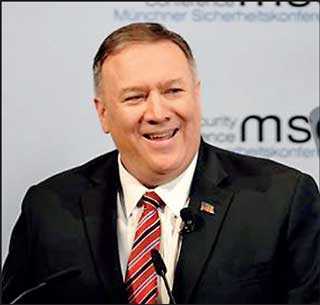Sunday Feb 22, 2026
Sunday Feb 22, 2026
Tuesday, 18 February 2020 00:00 - - {{hitsCtrl.values.hits}}
MUNICH (REUTERS): US Secretary of State Mike Pompeo defended on Saturday his nation’s global role despite misgivings in Europe, vowing that Western values would prevail over Russian and Chinese desires for “empire”.
 |
Mike Pompeo |
Seeking to reassure Europeans troubled by US President Donald Trump’s “America first” rhetoric, his ambivalence over the NATO military alliance and tariffs on European goods, Pompeo said there was no crisis in Western leadership.
“I’m happy to report that the death of the transatlantic alliance is grossly exaggerated. The West is winning, and we’re winning together,” he said in a speech at the Munich Security Conference, listing US steps to protect liberal democracies.
Pompeo’s Chinese counterpart, Wang Yi, accused him of telling “lies, not based on facts” about Beijing’s intentions.
Pompeo had been, in part, responding to German President Frank-Walter Steinmeier, who on Friday accused the United States, Russia and China of making the world more dangerous.
French President Emmanuel Macron told the conference of international leaders, lawmakers and diplomats he was not surprised by Steinmeier’s speech and had liked it.
“We cannot be the United States’ junior partner,” Macron said, adding that while he supported NATO, Europe needed to be able to tackle threats in its neighbourhood and at times act independently of Washington. “I’m impatient for European solutions,” Macron said.
Trump’s decision to pull out of the 2015 Iran nuclear deal, as well as the Paris climate accord, have undermined European priorities, while moves such as recognition of Jerusalem as Israel’s capital have weakened European diplomacy, envoys say.
Pompeo defended the US strategy, saying Europe, Japan and other American allies were united on China, Iran and Russia, despite “tactical differences.” Pompeo, however, reiterated Washington’s opposition to the Nord Stream 2 gas pipeline under construction between Russia and Germany under the Baltic Sea, a project backed by the government of German Chancellor Angela Merkel.
Citing Russia’s 2014 annexation of Crimea, cyber threats in Iran and economic coercion by China, Pompeo said those countries were still “desiring empires” and destabilising the rules-based international system.
Wang responded to Pompeo by saying: “All these accusations against China are lies, not based on facts.” But he added that Beijing was willing to sit down with Washington for “serious dialogue” and seek a less confrontational relationship. Macron said the West’s policy of defiance towards Russia in recent years had failed and, as nobody wanted to confront Moscow directly, the only option was to have a closer dialogue to resolve differences. “I hear the defiance of all our partners, I’m not mad, but I know that being defiant and weak ... is not a policy, it’s a completely inefficient system,” Macron told the conference.
“There is a second choice, which is to be demanding and restart a strategic dialogue because today we talk less and less, conflicts multiply and we aren’t able to resolve them, he added.
US Secretary of Defense Mark Esper, who spoke immediately after Pompeo, focused his remarks solely on China, accusing Beijing of a “nefarious strategy” through telecommunications firm Huawei.
“It is essential that we as an international community wake up to the challenges presented by Chinese manipulation of the long-standing international rules-based order,” Esper said.
He said Washington is working with technology companies in the United States and allied nations to develop alternatives to Chinese 5G vendors and is testing them at US military bases.
He added that it was not too late for Britain, which last month said it would allow Huawei a limited role in building its 5G networks, to take “two steps back,” but said he still needed to assess London’s decision.